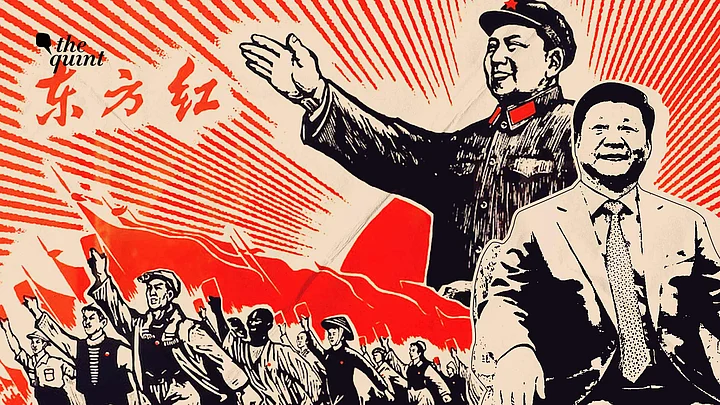As the 20th communist party congress of China is round the corner this November, the continuation or otherwise of its leader Xi Jinping has been debated extensively. There is also his tumultuous legacy since coming to power in 2012.
Last one decade had seen meteoric rise of Xi—with the dramatic arrest of his political rivals Bo Xilai and Zhou Yongkang and to his political consolidation.
His anti-corruption drive nearly decimated the base of his political rivals like Jiang Zemin and Hu Jintao. Xi soon acquired the sobriquet of “Chairman of everything” by centralising all levers of power. At the last count, Xi was holding 13 crucial positions of the party, state and the armed forces.
Xi Jinping's Military Might Against the World
Although there is a decline in economy growth rates from over 10 percent before 2010 to 2.4 percent in 2020, Xi’s period coincided with massive military modernisation and breakthroughs in science and technology. This further wetted Xi’s “accomplishing something” philosophy and to his grandiose plans for “socialist modernisation” by 2050.
Xi’s assertiveness also brought gains to China in South China Sea and other areas, although this led to an estrangement in relations with the neighbours. Xi’s identification of red lines with Taiwan has raised nationalist rhetoric. Xi decimated Hong Kong opposition through national security law.
Instead of Deng Xiaoping’s restraint policies, Xi not only grabbed disputed reefs in South China Sea but also refurbished them with military assets. Xi also crafted a policy of occupying disputed lands with India, despite his rhetoric of “developmental partnership”.
Xi also alienated Japan with aggressive transgressions in Senkaku islands administered by Japan.
How Strong is Xi Jinping on Home Ground?
At home, Xi rebooted the political spectrum by first filling crucial party-state posts with his “new Zhijiang Army” cadres and his home province Shaanxi leaders. Xi also ushered in a “new era” with ideological and political firmness. Everything seemed to be going Xi’s way.
However, since early this year, clear political signalling is visible to Xi’s relative decline, although in the intensive cesspool of Chinese politics and its opaqueness, it is hard to predict the outcome of the 20th party congress.
Let's read the tea leaves for portents.
Even though the 6th plenary meeting of the central committee in November last year at its third “historical resolution” glorified Xi, putting him at par with Mao Zedong and Deng Xiaoping and thereby downgrading his predecessors Jiang Zemin and Hu Jintao, the 5 May party meeting this year skipped mentioning Xi as the “core of the leadership” – an ominous signal for Xi’s decline. Besides, Xi’s selective extension of his Presidential term at the March 2018 parliament session had alerted his detractors in the party.
What Might Trouble Xi Jinping?
Firstly, Xi’s pet Belt and Road Initiative project is under stress from several quarters: decline in investments and interest, with debts of several nations increasing and their assets seized such as Hambantota port in Sri Lanka and challenged by the United States-led Build Back Better World and others for lack of transparency, violation of sovereignty principles and environmental disasters.
Secondly, Xi’s “dynamic zero Covid” policy is under attack given the massive impact on the welfare of the people, their livelihood, economic decline and the overall inconvenience to an estimate 400 million people in lockdown. China’s concerted narrative that its pandemic policies have been transparent and effective ignores the all-round debilitating effect these have had on the public. These were compounded by Xi’s “common prosperity” policies of curbing big businesses.
Thirdly, political factional struggles have intensified given the relative economic decline and rise in unemployment. With at least five out of seven members of the core decision-making body, the politburo standing committee, expected to retire based on age limit, intense political jockeying for these posts have been unleashed.
This is a do or die situation for rival factions in China as stakes are high.
Will the 'Shanghai Gang' Beat Xi Jinping in His Own Game?
The reform oriented “Shanghai gang” faction—still under Jiang Zemin, Zeng Qinghong and others' influence—is said to be concerned about the economic slowdown, restrictions on domestic businesses, decline in investments, gradual shift of manufacturing sector to other greener pastures in Vietnam and other countries, possible sanctions of western countries due to China’s position on the ongoing war in Ukraine.
As the political stakes are high, the Shanghai gang is likely to step up multiple attacks on Xi. Already in January this year, an article traced to Jiang’s faction titled “An objective evaluation of Xi Jinping” emerged with full invectives on Xi. This trend is expected to increase.
On the other hand, the conservative Communist Youth League—headed by Premier Li Keqiang and supported by a possible 6th generation of leader and vice premier Hu Chunhua—have been quietly working behind the scenes to checkmate Xi.
In the coming weeks the relative publicity given in the official media to Xi’s close aides like Chen Min’er, Li Hongzhang, Chen Xi, Shen Haixiong and others on the one hand and Communist Youth League leaders like Hu Chunhua, Wang Yang and others will indicate the rising stock of these factions.
It would be cataclysmic if Xi steps down at the next party congress. In such an unlikely scenario, the 6th generation of leaders would have to start afresh with its attendant political uncertainties. Despite all these set-backs, Xi may scrape through, possibly with his wings clipped with reduced majority support among the politburo members and ensuing compromises at all levels of governance.
(Srikanth Kondapalli is Dean of School of International Studies, Jawaharlal Nehru University. He tweets from @Sri_Kondapalli. This is an opinion piece and the views expressed above are the author’s own. The Quint neither endorses nor is responsible for them.)
